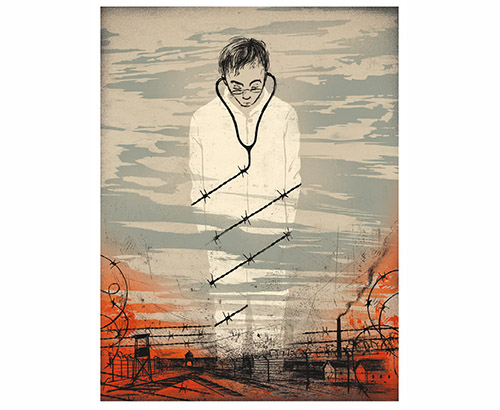


Dr. Stacy Gallin, founder and director of the Maimonides Institute for Medicine, Ethics and the Holocaust (MIMEH), has furthered the argument that modern bioethics emerged out of the ashes of the Holocaust as a reactive response to the abrogation of ethics and the abuse of power on the part of the medical profession. The systematic and systemic participation of physicians—those who took an oath to “First, do no harm”—in the labeling, persecution and eventual mass murder of millions of those deemed “unfit” during the Holocaust represents one of the darkest periods not only in the history of medicine, but in the history of humankind.
The German medical profession totally capitulated to the racial hygeine theory of the Nazis, which led to large-scale euthanasia of those considered undesirable and/or inferior as well as unspeakable experimentation on live subjects. There were some who refused but as heroic as they were, they were the minority who did not join the National Socialist Party.
This cautionary tale of what not to do became the defining feature of modern bioethics. Yet even in the darkest times, one can always find the light. Stories of physicians who remained dedicated to healing and saving lives in any way possible prove that ethics, virtues, values and hope can prevail. These tales of Jewish physicians and Righteous Gentiles who risked their lives to save others inspire a positive view of medicine and bioethics in which the power of the profession is harnessed for good, even in the most dire circumstances.
This past year has found our society faced with unprecedented challenges due to COVID-19. Those in the healthcare profession have been asked to put their own lives at risk to save others. They have also been tasked with determining equitable and just protocols for allocating scarce resources, ensuring that necessary and rapid human subject experimentation was performed ethically and with the full consent of those involved, and now they are charged with finding a way to distribute the resulting vaccines to the most vulnerable among us. The lessons of the Holocaust—how the power and privilege of medicine can be abused in times of crisis—have informed our current situation as we have struggled to meet this challenge in the most ethical manner possible.
This Yom Hashoah, while we cannot physically be together to commemorate the significance of this day, let us look to medicine and morality as a way to reflect on the past and protect the future while appreciating the miraculous and selfless work of our healthcare professionals during this global pandemic.
On April 7, the Miller Center for Community Protection and Resilience at Rutgers University, International March of the Living and the Maimonides Institute for Medicine, Ethics and the Holocaust, will present “Medicine and Morality: Lessons From the Holocaust and COVID-19.” This program, produced in cooperation with the USC Shoah Foundation and with the support of international medical associations including the World Medical Association and the Israeli Medical Association, will bring together world renowned scholars in the field of medical ethics and the Holocaust to explore the relevance of medicine, ethics and the Holocaust for our past, present and future.
In addition to the world-class physicians from around the world, remarks will be made by Dr. Anthony Fauci, who will receive the coveted Moral Courage in Medicine Award. The program will be broadcast on JBS (Jewish Broadcasting Service) TV at 7 p.m. EST and will also be available online at
www.motl.org and www.mimeh.org.
Physicians and nurses who participate will receive accreditation for 1.5 hours of ACCME (Accreditation Council for Continuing Medical Education) credits. Pharmacists will receive 0.15 CEUs (1.50 contact hours) of continuing education credit.
Dr. Wallace Greene, who has lectured and written about the Holocaust and who serves on the UJA Holocaust Commemoration Committee, is one of the producers of this program.










